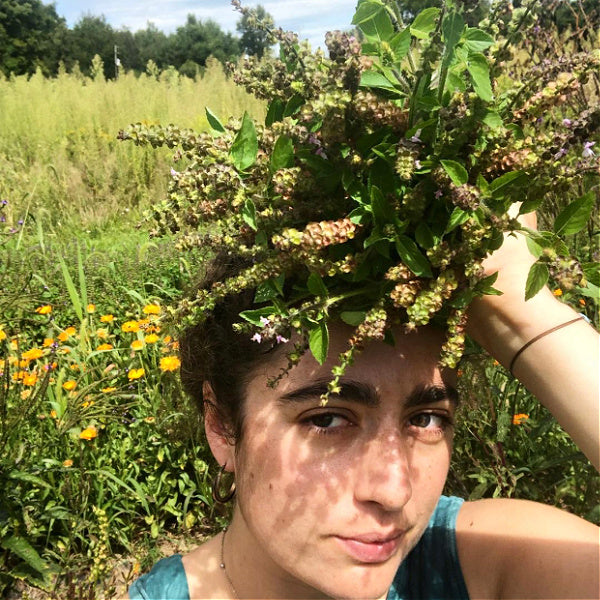Aviva Skye Tilson, founder of Apis Apotheca. Photography courtesy of Apis Apotheca
Farm to table, sure. But farm to face? Yes!
Those of us with acne, dry skin, red skin, inexplicably flaky skin, psoriasis, eczema, and mysterious brown patches can attest to the strange and decidedly unpleasing aesthetic impact that chemical-based skincare has had on our epidermises.
Aviva Skye Tilson, organic farmer and herbalist, observed the effects not just of the additives, dyes, and unpronounceable chemicals, but also of her diet, on her own skin.
She also knew that the beauty industry’s packaging was creating an enormous amount of pollution and habitat loss. According to Zero Waste Week, more than 120 billion units of packaging are produced by the cosmetic industry annually, with 18 million acres of forest going toward that packaging.
Tilson decided to harness all of her acquired skills and knowledge to create a set of solutions to these issues — for herself and for us. The result: a line of products made from organically and biodynamically grown herbs, flowers, and plants she tends and processes herself, then shares with the world in compostable packaging. Please read on for more about Tilson and Apis Apotheca.

NEW YORK MAKERS: We always want to hear a company’s founding story. Please tell us yours!
AVIVA SKYE TILSON: I was raised in New York City, but I always connected with the natural world. As I grew up, I had pretty severe acne, but I figured it was just part of adolescence. It wasn’t until I was 19 years old, when I broke my foot, that I started to get to the root of the problem. This was back in 2011, and, when my doctor found out I broke my foot by just tripping, she instinctively knew there was something else going on. She sent me to her husband, a gastroenterologist, and he diagnosed me with Celiac disease. He said I had the highest reaction to the test that he’d seen. I started realizing that my diet was deeply connected to my health, how I felt, and even how I looked. One thing led to another, and I began learning more and more about food, farming, and natural skin care.
NYM: You actually spent a great deal of time as a farmer, right?
AST: Yes, and I still consider a lot of what I do as farming because we look at every aspect of how something is grown, harvested, and processed, and I think of the effect it can have on the people who use our products. I worked at several farms in Vermont and at Hawthorne Valley in New York, where I milked cows and grew vegetables. That way of life awoke something in me, and I realized that I was spending as much time looking at the weeds I was pulling as I was at the vegetables. I decided to enroll at AborVitae to study herbs. I really started Apis formally in 2016, and my husband, Ryan Surrano, who was a ginseng farmer when I met him, has been integral to this process. We rented land from a farm in Vermont, and then again in the Hudson Valley when we moved here. We bought a house with land right at the end of normal times before COVID really hit, after looking for two years.


NYM: Congratulations! Are you planning on planting there?
AST: We are in the process of doing that now, but it requires a lot of prep work. Ryan and I are putting up deer fencing, preparing the land. We have 2.5 acres, but, for now, I am just going to plant a half acre with about 12 plants like gromwell, chamomile, marshmallow root. But yes, I’ll be able to plant and harvest this spring and summer. Our farm is high on a hill facing the Catskill Mountains and the soil is so deep and rich. Ryan is creating his own nursery called “Maidenhair Eco”, and it’s so wonderful to be here, working together. We’re so excited to finally be able to be growing our own ingredients.
NYM: Where do you get other ingredients that you can’t grow yourselves?
AST: We get everything as locally as we can. We will grow whatever we can here, and then continue to source herbs, barks, and mushrooms in the Hudson Valley and Vermont. We get sunflower seed oil in Geneva, NY, and beeswax from West Grove, PA.

Dragon Balm Rich Firming Unguent and Flower Sap Hydration Harmonizer >>

NYM: How has Apis evolved and grown over the years?
AST: I started out really just selling at farmers markets and specialty markets. The first year, I was still working as a waitress to make ends meet. But, over time, I’ve been able to let go of other work and smaller markets. We’re now sold in several states, online, in Canada, and in Hong Kong. It’s amazing. I’ve also been able to focus on how the products are made and packaged. I do everything here at my on-site lab, which is solar powered. I recycle and compost everything I can because I truly believe that everything is full circle. I want the entire company to be in concert with nature, not combating it. Our new boxes are compostable and printed on recycled paper. I also offer completely compostable packaging refills, and I’ve been so excited to see how much use my customers are making of it. I see this pandemic as an opportunity for all of us to achieve more balance in our lives, to reconsider what’s important and to commit to creating a better and healthier earth for us and for future generations. I look at Apis as not just a skin brand, but a way that I have deepened my, and customers can deepen their, relationship with nature.

Honey Mallow Replenishing Nectar Whip >>



Leave a comment